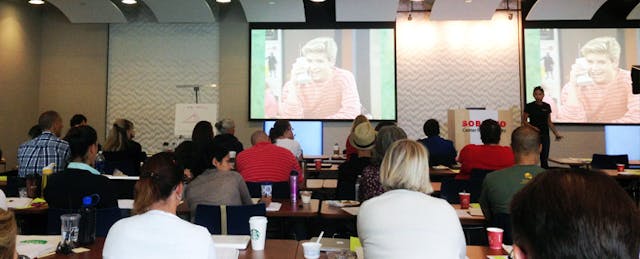Are teachers at the table or on the menu? No company would dispute the value of teacher perspectives. However, it often seems that teachers become specimens to be studied, rather than vital partners. Yet, giving teachers time and training, and building trust are critical steps to ensuring products get used--and used effectively.
This week, Khan Academy showed the industry one way to bring teachers to the table by hosting its own free teacher trainings in Redwood City. As the first of many around the country, the workshop aimed to teach math teachers about the nuances behind each of Khan’s education tools and offer different ways to implement them. By the end of the day, teachers were charged with developing a “frame of mind” around what Khan could do for students.
The full day of training took place at the Sobratto Center for Nonprofits in affluent Redwood Shores, CA, where over 100 teachers filled the room.
Coming From Far and Wide
The event attracted teachers from cities near and far, from charter, public and private schools in Sacramento and Santa Cruz to those Grand Rapids, MI. Some came for at the behest of their supervisors, others by way of parent recommendations, but most teachers were there because they’d tried Khan before but wanted to dig deeper into how they could more fully implement it in their classrooms.
Typically, teachers only get training for products that their schools have paid for. So they appreciated that Khan put on this session without a price tag. “This is certainly one of the only places I’ve seen where something is completely free,” said one teacher.
Start Simple, Just Try
Marueen Suhendra, in charge of school partnerships for Khan Academy, began the day by emphasizing that Khan Acadmey's role isn't trying to prescribe how teachers should use the program. “Today is not about giving you a scripted curriculum. There is no right way to do this.” Instead, teachers need to stay flexible and open-minded as they explore for themselves how Khan can best be implemented in the classroom.
Teachers then split into groups and spent the first half of the morning digging deeper into coaching tools, with a self-guided tour through Khan’s world of data. Khan developers were on hand to answer questions and break things down for teachers when they got stuck. Teachers spent the rest of the day consulting experts, exploring case studies, and planning out their own implementation models. Teachers in Residence at Khan Academy, Tal Sztainer and Sunny Park, were also on hand to share their personal stories and experiences of implementing the tools in their own classrooms.
Park, a 15-year veteran teacher, was initially scared by the prospect of fully integrating Khan into her classroom. Dipping her foot into the Khan Academy waters, she began by integrating the videos and exercises one unit at a time. However, the persistent need for even more differentiation led Park to creating playlists of exercises ahead of time so that students could dip in and out of practicing different skills as they pleased, regardless of the unit the class was on.
Park will continue to integrate Khan Academy next year, she says, retaining the aspects of differentiation her students have enjoyed. However, she hopes to add more depth to each unit with real life application projects--an area that Khan Academy has historically lacked.
On what she’s learned from her experience using the tools, Park says “there is a fluidity that I didn’t expect to be possible... I thought that learning the content was very linear, but these connections [between concepts] can be made and they can hold multiple pieces of information at one time when it comes to math.”
Important Ingredients
As Khan Academy wrapped up its first workshops this week in Redwood Shores, the organization looks forward to the next stop on its PD tour: Chicago. But at least in Redwood City, the Khan team learned from the teachers about the elements that will bring educators to the table:
First, the sessions need to be about more than just a product. What the Khan Academy team did so well this week was convince teachers that they care, starting with offering the workshop for free. The team continued to demonstrate this as they discussed mission and vision throughout the workshop. They also make it clear that the training was about helping teachers to find ways to help their kids, rather than forcing a preconceived implementation plan on them.
The second ingredient in bringing teachers to the table was to show that they “get” what it’s like to be a teacher on a very deep level. From the beginning the Khan representatives explained that they expect kids will throw curveballs during the initial implementation plans--and that the final picture rarely looks like what teachers originally have in mind. They also seemed to understand the emotional side of teaching. “Every teacher knows they can’t reach every kid and there is this guilt that results," Park noted. "Khan Academy addresses that discomfort that teachers feel and gives some ideas on how to make it better.”
We’ve Only Just Begun
The road toward effectively implementing technology is a long one. We’ve only just begun. The most crucial steps include training teachers, giving them time to integrate tools into their practice, and building trust that new tools are worth their time. So, following the example set by these Khan Academy workshops, a big question for most edtech companies should be how can you take teachers off the menu and bring them around the table?


